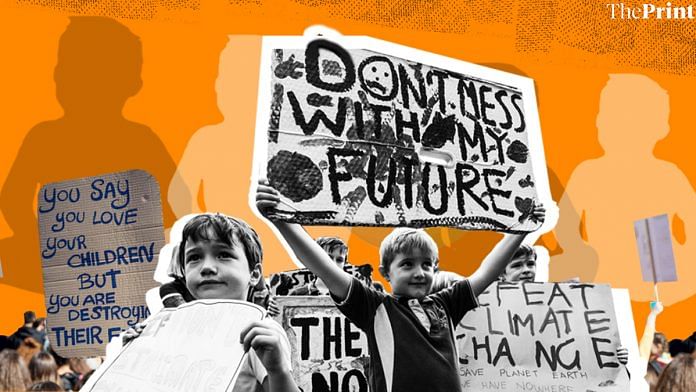Climate change activists across the globe are giving a call for ‘birth strike’. They believe they can’t bring children “into a world where scientists predict climate change will bring bigger wildfires, more droughts, and food shortages for millions of people”. According to a UN report, India is projected to surpass China as the world’s most populous country around 2027.
ThePrint asks: Should Indians join the call for ‘birth strike’ by global climate change activists?
Not bringing a child into a dystopian near-future is perfectly understandable
 Sandhya Ramesh
Sandhya Ramesh
Senior assistant editor, ThePrint
A ‘birth strike’ is an individual, subjective choice and should be supported. A ‘birth strike’ due to the climate crisis comes with its own valid and flawed arguments.
A common reason put forth by many for not having children is that humans degrade the environment, and studies have shown this.
While the statement is objectively true, studies have also made it clear that to be environment-conscious, one must bring about attitudinal changes to curb emissions, turn vegan and avoid plastic.
However, if the concern is that the next generation will be adversely affected by climate change in terms of health, economy and geopolitical tensions, the argument warrants merit.
As the awareness about global warming and climate change increases, the demand for renewables will go up in the near future. But the next generation will be the worst hit and the least equipped to deal with the crisis.
An ethical stand on not bringing a child into a dystopian near-future is completely understandable and, arguably, even practical.
BirthStrike movement is more of a millennial, self-serving fantasy and less of a viable solution
 Srijan Shukla
Srijan Shukla
Reporter, ThePrint
Not having kids in order to save the planet is yet another ‘progressive’ idea that is unlikely to give you the desired results.
India already has a very high population and a few thousand people not having kids isn’t going to substantially reduce global warming.
As several scientists and practitioners of development management argue, India needs a well-thought-out environment policy, which has a holistic perspective and takes into account several variables.
Most importantly, the Indian environmental policy must start thinking about the marginalised. Often these people face the worst consequences of erratic environmental shifts. The urban-centric anti-birth campaigners are disconnected from the perils of the farmer who suffers because of unexpected droughts.
Here, the BirthStrike movement seems more of a millennial, self-serving fantasy and less of a viable solution.
Moreover, having kids or not is a matter of individual choice and in that sense, if any individual wants to join the movement, she should. But the state per se has no business to legislate on this matter.
India currently faces a unique problem. While at an aggregate level, the population growth rate has seen a drop in the last few years, there is a massive north-south divide in fertility rates – the Hindi-speaking states have recorded much higher fertility rates compared to the national average.
There is an urgent need to address this issue. Instead of bringing in blanket policies, the state needs to offer the right incentives for people to have fewer kids.
But beyond population control, the key to saving planet lies in radical ways that can substantially reduce our carbon footprints.
Also read: India can’t commit to climate change abroad and be non-compliant on environment at home
Indians are obsessed with having their ‘own’ child and extending their blood line
 Himani Chandna
Himani Chandna
Special correspondent, ThePrint
Having a child is a personal choice. But it’s easier said than done for many Indians.
In a traditional Indian house, the decision of having a child still rests less with the girl and more with the ‘husband’ or the ‘mother-in-law’.
There are few DINK (Double Income No Kids) couples in India, although their number is gradually increasing.
Asking Indian couples to participate in the BirthStrike movement – a small group, mostly women, have pledged to not have children because of climate change – could fetch you a temporary answer. Over time, many women can experience ‘motherhood desires’ or face family and societal pressures.
Indians are obsessed with having their ‘own’ child and extending their blood line (read surname). A recent UN report says that “by around 2027, India is projected to overtake China as the world’s most populous country”.
About 84 per cent of the married youth had an arranged marriage, as per a survey by the Centre for the Study of Developing Societies (CSDS) in April-May 2016.
In Delhi, the in vitro fertilisation (IVF) capital of the country, at least 1,000 IVF procedures are conducted every day. A new report by Allied Market Research consultancy says IVF services industry in India will be worth an estimated $775.9 million by 2022.
If procreation is a natural right, then it is a right of all the species to procreate freely
 Sanya Dhingra
Sanya Dhingra
Principal correspondent, ThePrint
Human beings are easily the most privileged, spoilt and entitled species to exist on this planet. After encroaching upon the habitats of every other species, we glibly declare them vermin.
From ordering the culling of nilgai to taking people to court over feeding street dogs, from breeding some animals artificially for the sake of consumption (and trying to pass it off as part of the natural food chain) to neutering any animal for the sake of population control, we dictate every aspect of the lives of animals.
But when it comes to talking about population control among human beings, we suddenly don’t want to talk about environment. We want to talk about tradition and biology, and celebrate every human birth as a gift to humanity.
If procreation is a natural right, then it is a right of all the species to procreate freely. But if we think that procreation has to be regulated in the face of climate change and environmental degradation, we cannot excuse ourselves from this regulation.
If we are going to artificially bring down the mortality rate using science, then we should be willing to artificially check the birth rates as well.
Also read: Most of us were born into climate change — it’s the only world we’ve ever known
Unethical to have children in a world that is facing another mass extinction
 Neera Majumdar
Neera Majumdar
Journalist, ThePrint
Chennai is grappling with a major water crisis this summer. The cities reservoirs are almost dry and its groundwater has significantly gone down. By NITI Aayog’s calculations, 21 major cities in India — including the capital, New Delhi — will have completely run out of groundwater by 2020. That’s next year.
India faced its hottest summer this year in decades— with temperatures in some places rising to 50 degree Celsius. On the same day, eight Indian cities were among the 15 hottest places in the world. This is also the second lowest pre-monsoonrainfall the country has experienced in 65 years.
The air pollution is such that each year, in winter, children go to school wearing masks and stay indoors instead of playing. According to the WHO, one lakh children died in India in 2016 due to air pollution-related illnesses.
Our food is garnished with chemicals, our water with metals and plastic.
And if these aren’t enough to give us death and disease on a platter, our social identities (caste, sex, religion, ethnicity) definitely will.
It is unethical to have children in a world that is facing another mass extinction and unprecedented climate change. It is selfish to think about your own tiny family and not the world in these times. It is stupid to create life and leave it to fend for itself in a hostile and rapidly changing world.
India is populated enough, it’s time it goes on a birth strike for its own good.




Wonderful philosophical article.
2-child policy implemented in India asap. Else the responsible citizenry having 1-2 kids per couple will inevitably choose to have no kids. We don’t want this to happen
Tell the Mohammedans first – then everyone else will follow.
5 wives 50 children is not the policy of Dharmics or Christanity or Judaism.
A world without humans would be even more dreadful than one without tigers in the Sundarbans, my beloved wildebeest and lions on the Serengeti. 7.5 billion of us are overwhelming all the life sustaining systems of the planet. So we should restrict the numbers, stop burning fossil fuels, bring our lifestyles more in harmony with nature. 2. If one reviews the growth of our extended family since 1947, things are slowing down between the sheets. Grandmother would say good naturedly, I produced six sons. Between them, they have struggled to reach that number. Our Ananya is now the little empress – two loving parents, four doting grandparents.